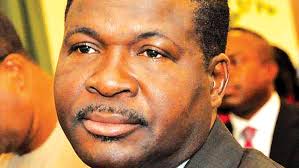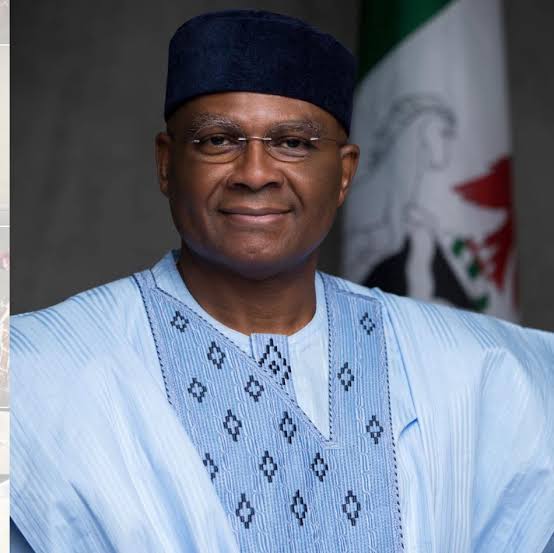BY PROF. MIKE OZEKHOME
INTRODUCTION
The journalist and prose writer in me screams to manifest today. Far away from gladiatorial courtroom litigation and suffocating trenches. They urge me to move away today from the classroom, soapbox and television screen. I am today compelled to write on the topical trending issue of the moment– “GO TO COURT”. Yes, you heard me right: go to court. Nigeria is a great country, but a very interesting one with spectacular oddities and oxymorons. Every day is new. I love her to no end.
WHY GO TO COURT?
Politicians, sorry, Politricians, have popularised “Go to Court” in their morbid desperation to acquire power at all cost. By hook or by crook. They are desperados. They have been very successful in messing up our hard-earned democracy. They carry out unspeakable acts – bizarre acts drained of logic, legality, constitutionality and morality – and then tell you to your face, “Go to Court”. This is a sad sarcasm of their obvious derisive, pejorative and derogatory euphemism for our beleaguered justice–delivery systems.
What the Politricians are saying cheek-in-tongue, in effect, shorn of all pretences, affectation and braggadocio, is that they believe you cannot get justice in the courts. So, they taunt you to ‘go to court’. Before, during and after elections, they kill, maim, burn, thumbprint; steal and allocate ballot boxes and paper; steal BVAs machines; propel their candidates to “win at all costs”; select their winners; and collude with INEC to announce their preferred victors. Then, they humour you with, “Go to Court”. For you, my readers, if you do not like this my introductory part, please, do me a favour – go to court.
EXPANDING NIGERIA’S POLITICAL LEXICON
The new refrain in town – go to court – is therefore an obvious addition to our ever-elastic warped political lexicon. Webster, Oxford, Collins, Longman, Black – all Dictionary exponents – must be green with envy from their cold graves.
I have since added new words to our political vocabulary and encyclopedia – “Electionocracy”; “Selectocracy”; “Judocracy”; “Executocracy” and “Legislatocracy”. (see https://www.page36news.com, “Mike Ozekhome says we are not practicing democracy in Nigeria”; https://barristersng.com, Is this the Nigeria of our dreams?”; https://ThisNigeria.com, Nigeria is a captured state”.

THE FLAWED 2023 GENERAL ELECTIONS
The last Presidential, NASS, Governorship and State Houses of Assembly elections were the worst I have ever witnessed in this contraption called Nigeria since the amalgamation of the Northern and Southern Protectorates by Lord Frederick Lugard (22nd January, 1858 – 11th April, 1945), on the 1st of January, 1914, to found Nigeria. If you do not like this opinion of mine, go to court.
I guffawed when I heard President Muhammadu Buhari, in congratulating Asiwaju Bola Ahmed Tinubu, on his presumed victory at the 25th February, 2023 presidential election, say, “None of the issues registered represents a challenge to the freeness and fairness of the elections”. Mr. President, did I hear you correctly sir? I can already see through the eyes of the minds of his handlers and coterie of media snipers, and those of Tinubu, calling me out. I can hear them telling me to “go to court” if I do not like the President’s biased stance expressed in the face of stiff challenge by his co-contestants. My simple response is, go to court if you do not like my own critique.
No sir, Mr. President. I humbly disagree, sir. The last elections were neither free, fair, transparent, honest, respectable, nor imbued with any iota of integrity and dignity. They represented an abysmal retrogression into Australopithecus stone-age election farce. The elections were clearly shambolic, unsystematic, mismanaged, violent, vicious; highly compromised; and drained of any local or international respect and recognition. The outright rejection of, or at best, very lukewarm tolerance of (not wholesome acceptance or embrace) by the international community, speaks volumes of the elections’ lack of rectitude and honour. Any final emergent product of the fundamentally flawed presidential election will have a moral burden to contend with – even if court judgements were to favour him. The moral burden will hang like an albatross, on his neck throughout his entire tenure of office. It will be more like an ignoble trophy or diadem. I shudder to conjecture the ricocheting effect and dire consequences this forebodes for Nigeria. I am not a seer or clairvoyant, but I can tell Nigerians categorically to brace up for harder times ahead. If you are not comfortable with these humble views of mine, then go to court.
THE “BINANIGATE”
The hallmark of this “go to court” mantra finally crystallised last week during the gubernatorial election in Adamawa state. The events there represent the shame of a country whose citizens, having experienced too many doses of travails, now appear unshockable. I have since been stressed and distressed. Can this shame be wiped off our electoral slate, or democracy syllabus? I do not know. Or, do you? The deeds and misdeeds that attended the Adamawa macabre dance of death remind me of the regretful and symbolic words of Macbeth, in William Shakespeare’s epic “Macbeth” (Act II, Scene II).
In bemoaning his unprovoked decision to assassinate King Duncan, Macbeth lamented that all the oceans of the world would not be capable of washing the blood from his hands. This was even before killing King Duncan. Hear Macbeth: “Will all great Neptune’s Ocean wash this blood clean from my hand? No, this my hand will rather the multitudinous seas incarnadine, making the green one red”. If you do not like my taking you back to Shakespearean literature to allegorize and metaphorize these points of mine, then, go to court.
Like many Nigerians, I keenly followed the Binani phenomenon – now “BinaniGATE” (most unfortunately). I like the Senator’s quiet mien, respectable carriage, calm disposition and ever-smiling exterior. She appears incandescent, even if shy. These qualities belied a steely, strong-willed “Margaret Thatcher” of an iron lady, who had taken Adamawa politics by storm, breaking down chauvinistic barriers, and mauling entrenched fixations and stereotypes. My love went straight to her, like the one I had for my late dear mother who died in 1997. I had grown up with my parents in Iviukwe town, in the 60s and 70s. I went to the farm, and far-flung streams with my late mother and late father, who died in 1992. I followed her to dig and plant into ridges, groundnut, beans, cocoyam, maize and yam. I fetched firewood from scorpion-infested dried trees. I fetched water from stagnant spirogyra-infested streams and dirty ponds, with calabashes. We then used alum to purify the water. So, I saw my mother in Binani. I also suddenly saw in Binani, my dear wife – my pillar of strength; my soulmate; my girlfriend; my confidant and sister; my mother and best friend in the world. For these reasons, and propelled by her top-notch political credentials, I, like many Nigerians, silently yearned that she won in a free, fair and transparent election. This, for me, notwithstanding that the big “home boys” holding fort in Adamawa are my elder and younger friends, respectively – former VP, Waziri Atiku Abubakar and Governor Ahmadu Fintiri. But what did we see? A damnatory and ruinous anti-climax.
A sad summersault indeed! Binani was declared “winner” of an election whose supplementary results were still being collated and counted. It was done by an unauthorized and illegal person – the State Resident Electoral Commissioner (REC) – rather than the INEC-appointed Returning Officer. This, even while she was trailing her main opponent, Governor Fintiri, by over 31,000 votes! Wonders shall never end. She had wanted to foist on INEC, the courts and sympathetic Nigerians (like me), a situation of fait accompli. She will then tell Fintiri to “go to court”. The INEC REC’s audaciousness and brazen acts appear modeled after the INEC leadership itself, which had condoned and facilitated huge electoral malpractices, and told Nigerians to go to court.
THE BACKGROUND TO THE FAILED COUP
Let us have a historical background to this electoral fraud which was actually, a failed coup d’etat.
On 18th March, 2023, Adamawa residents went to the polls, hopeful of the workings of democracy – a concept defined by Abraham Lincoln (with penetrating erudition) in his Gettysburg Declaration on 19th November, 1863, as “government of the people, by the people and for the people”. At the close of voting, sitting Governor, Ahmadu Fintiri, garnered a total of 421,522 votes to lead in 13 of the 21 LGAs of Adamawa State. He beat his closest rival, Aisha Dahiru (A.KA. Binani) by over 32,000 votes, as she trailed with 390,275 votes obtained in 8 LGAs. Mohammed Mele, a Professor of English at the University of Maiduguri, who was the INEC-appointed Returning Officer (and who is the only statutorily authorized person under section 25 of the Electoral Act, 2022, to declare governorship results and announce the winner), however, announced that the election was inconclusive. His reason was that the margin of victory by Fintiri was less that the total votes expected from 69 polling units in 20 LGAs affected by serious electoral issues. In those polling units, there are 42,785 registered voters. But those who collected their PVCs were only 36,955.
All very well and good, if, this was systematic and methodical. It was not. Why didn’t the same INEC use a similar yardstick to withhold declaring Governor Dapo Abiodun of Ogun State as the winner of the same 18th March, 2023 gubernatorial election, when the challenger, Chief Oladipupo Adebutu only trailed Abiodun by a mere 13,915 votes, with only 18,835 votes rejected? Why the duplicity and double standards by INEC in declaring Abiodun the winner then, as against its refusal to declare Fintiri the winner at the first election of 18th March, 2023, under the same circumstances? Abiodun and APC (and even INEC) had simply told Adebutu to go to court. Go to court, he has since done.
THE ADAMAWA CIRCUS SHOW
What happened next could be taken straight from a poorly acted local movie, with desperate script writers and caricature choreographers. It was like a dramatic circus show; a Baba Sala’s Alawada Keri Keri piece of histrionics.
During the supplementary election that took place on April 15, 2023, Fintiri had been clearly leading, with 19,337 votes, to Binani’s 6,513. The gap difference was 2, 824. This was, however, only in 10 LGAs of the 20 LGAs in which voting took place. When you add these 2,824 votes to Fintiri’s March 18 lead of 31,247, Fintiri was surely galloping home to victory with 34,071 votes ahead of Binani. Then some unseen hands struck. They usually behave like witches and wizards in a coven.
With results from 10 out of 20 LGAs already in, the Returning Officer adjourned proceedings to 11 am of the following day. Suddenly (like Fela Kuti of blessed memory would say), one Hudu Ari, the Adamawa Resident Electoral Commissioner (REC), struck at 9 am, before the 11 am earmarked for the continuation. Surrounded and escorted by an armada of recruited armed-to-the-teeth Soldiers, DSS operatives, Civil Defence goons, the Police, and thugs, Ari casually strolled into the collation centre, brandishing a folded written piece of paper that contained no final result.
To the shock of all present, he proceeded to announce and declare Binani as the “winner” of the election, whose results were still being collated. The loser who was trailing behind by over 34,000 votes was declared “winner”. Their agenda? Go to court? And bam! Binani “accepted” her “victory”. She was undoubtedly part and parcel of the orchestrated charade and shameful events. If not, how would she have prepared an acceptance speech for results she had not yet seen or known about, just like others? How come only NTA (the Federal Government’s megaphone) was the only media that covered the vaudeville and travesty? In her 21 seconds clip of historical profanity and feminine remissness and delinquency, she told angry Adamawa citizens that “you’ve made history in electing the first female governor in our dear country, Nigeria. This will no doubt broaden political participation by encouraging our daughters, aunties, mothers and indeed our girl child”. Oh blimey! The sentiments! The emotionalism!
Binani not done, even audaciously approached the Federal High Court (yes, in fulfillment of the “go to court” carol), through an ex parte application and urged Justice Inyang Ekwo on 17th April, 2023, to give judicial imprimatur to her sins, in motion No FHC/ABJ/CS/510/2023. Ekwo was a “Daniel come to Judgement”. He rejected the ex parte application. The cerebral Jurist suo motu raised the critical issue of jurisdiction. He directed Binani’s Counsel to return on 26th April, 2023, to convince him that the court has jurisdiction over the matter.
For once, INEC acted swiftly, salvaging whatever remains of its bruised image in the Adamawa theatrics. It suspended further collation; recalled Ari to Abuja; declared null, void and of no effect, the purported declaration of Binani as winner, as it amounted to usurpation of the powers of the Returning Officer. It also vowed to petition IGP (Usman Baba) to investigate and possibly prosecute Ari. INEC also requested the SGF, Boss Mustapha, to brief Buhari (the appointing authority), about Ari’s show of shame.
Will Ari, the DSS, Police, Military, FRSC, Civil Defence Personnel and even Binani be prosecuted under sections 64, 120 and 121 of the Electoral Act, 2022, to set a clear signal that Nigeria is not a banana Republic? Only time will tell. But, for now, go to court. Did the alleged bribery with the sum of N2 billion actually change hands to bring about this attempted monumental heist and thievery? Who will dig in and inform Nigerians? Which rat will bell the cat? Only time will tell. But, for now, go to court.
As at today, Fintiri has been properly pronounced re-elected Governor of Adamawa State. For those who are dissatisfied with this, go to court. For those who enjoyed this write-up, go to court. For those who loathe what I have written, go to court. For all Nigerians, go to court. For the Judges who will sit over this election matters, go to court. Finally, for the court themselves that harbour the Judges who will hear the matters, go to court. Let us all go to court.




